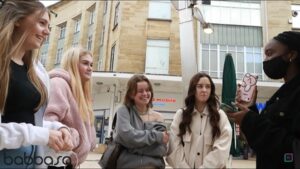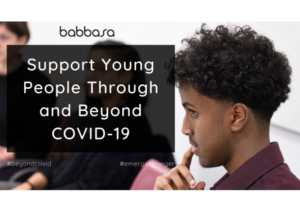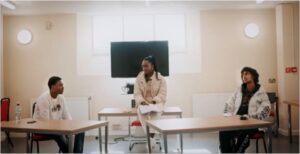Babbasa – inspiring support and help for young BAME people in Covid times
Babbasa was founded in 2013 by four young graduates who observed rising levels of youth unemployment, educational underachievement and the rapid decline in youth aspirations in Bristol’s Black, Asian and minority ethnic (BAME) inner-city communities.
Today, Babbasa is a well-established, multi-award-winning youth organisation and, in April 2020, was the proud recipient of a Queen’s Award for Enterprise for promoting opportunity through social mobility. These awards are recognition of the proven track record that Babbasa has for effectively tackling social and economic disadvantage amongst young people in areas of the city such as Ashley, Easton and Lawrence Hill – some of the most deprived wards in the UK.
Babbasa focuses its efforts and energy on three core areas:
- Youth Empowerment – supporting young people to improve their wellbeing, develop new skills, become role models and start their dream careers
- Recruitment support – connecting local businesses with a diverse and ambitious pool of young talent, that they may otherwise struggle to reach
- Building attractive and inclusive work environments by providing inclusion training and strategic support
Clearly, their impact and reach are significant. Over 2,200 young people from 67 different cultural groups have been helped to become more confident or move into work, education, or business since 2013, and around 300 people join their programmes each year.
However – then came COVID-19, a catastrophic global pandemic that caused the world to falter, impacting everyone, but perhaps more so, those people and communities that already needed deeper, more specific help than others. Babbasa moved quickly, recognising that they could not offer their usual means of support, and they started to see higher levels of referrals into their services as the lockdowns impacted young people. With schools closed, those young people still in the education system were struggling to access online learning for various reasons, whilst those seeking placement and employment opportunities saw these disappear before their eyes, with companies and businesses not operating in a typical fashion.
Babbasa conducted research with their young participants to understand their changing experiences as a result of the pandemic, which confirmed that young people from BAME communities felt an increased fear of the future and anticipated less stable employment opportunities, with 40% seeing their future career prospects as “bleak” due to the pandemic. Never had it been more important that young people from vulnerable communities should be supported, mentored and given a sense of structure and guided on a path to help them get employment in their desired industry.
Lockdown conditions meant that Babbasa needed to adapt and change how it supported all the young people currently on their programmes and those increasing numbers asking for support and help. This type of change and activity required additional funding; Babbassa approached several organisations, including The Society of Merchant Venturers (SMV), for support. SMV was pleased to award a grant of £5,000, which was combined with several other grants and donations to enable Babbasa to deliver its aims and objectives, which were:
- To engage 150 young people (16-2%) of colour and from disadvantaged backgrounds.
- To intervene early with 60 young people, identified as particularly vulnerable or at risk due to the personal, economic and social impact of Covid-19. (SMV’s grant was primarily used for this group)
- To offer flexible and tailored support by adapting Babbasa’s strength-based support programme to provide individual support via phone, video and face-to-face where possible.
With the funding from SMV and other sources in place, Babassa were able to keep their core team in full-time employment providing support for young people. They worked to adapt all work placements to be carried out remotely and ensured they could still reach young people who could benefit from their services by utilising social media.
The impact of the funding and the hard work of team Babbassa has been significant,
- An additional 116 young people (above those already on their existing core programmes) were supported with help for their CV’s, personal statements, job applications, skills development and pastoral care that they were missing due to school closures.
- Adapting their outreach programme by creating “Babbasa TV”, an interactive video service and discussion show. Babbasa TV has become an established platform – where young people can have a voice and share their personal experiences of being a young person across a broad range of topics. The first online event attracted 300 young viewers alone.
- Providing open access resources and virtual “drop-in” sessions enabled 30 young people to connect with a professional mentor and self-help outside group sessions.
- 10 young people on the placement programme started remote work placement with local businesses such as SunLife, Wessex Water, Barbal and ICON films.
- 71% of the young people they engaged with achieved a positive outcome for their future – such as becoming economically active, returning to education, becoming employed or referral to additional support services.
There are many inspiring stories from young people who have been supported and helped by Babbasa in 2020. Here is one, a young male who was one of the 60 young people identified as being particularly at risk and the SMV funding went towards:
AZ is 16 years old and experiences significant social anxiety, which worsened due to the pandemic. He was referred to Babbasa in September 2020 to help increase his self-confidence and independence by being linked in with peers and gaining a male role model.
Interventions were a mix of face-to-face (following Babbasa’s COVID-19 safe working policy) and adapted online support sessions for three months. AZ is on the Autistic Spectrum, which impacts his understanding of the world, how he relates to people, and his needs and preferences regarding learning, environment, instructions, and how he approaches and carries out his daily routines.
AZ shared that he had a strong motivation to work with animals in the future. Hence, the Support Lead encouraged him to think about and record examples of skills, knowledge, and qualities relevant to the profession. Activities were also introduced to help increase AZ’s confidence and help reduce his anxiety, including breathing and yoga techniques.
Other examples of support included preparation and guidance for a virtual tour and appointment with City of Bristol College for a place on their Animal Care Course. Along with what sort of questions to ask and techniques for keeping calm during the appointment.
The Support Lead also supported AZ to be referred to OTR (Off The Record) for a place on their Mind Aid Course and receive additional well-being support from their service. This helped AZ with his mental health and allowed him to meet some new young people of a similar age to him.
He was also supported to apply to become a volunteer for The Cinnamon Trust in December. The Cinnamon Trust is a national fostering service for elderly or sick people who need their dogs walked. Babbasa accompanied AZ to complete some dog walking in his local area, which helped increase his knowledge of caring for animals. This opportunity has started to help AZ to develop his independence skills.
AZ has shared some advice and tips on how to maintain a positive mindset in this voice recording.




